<> Troides aeacus (Felder, 1860) <>
the Golden Birdwing ผีเสื้อถุงทองธรรมดา
Click on any photo to see all photos full size in Lightbox
Additions and corrections to the information provided on this page is always welcome. Please use the Contact form.
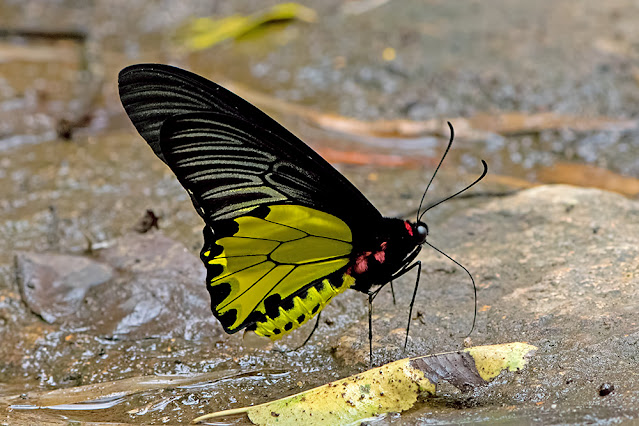
Photo taken at Lamnamkok National Park, Chiang Rai, Thailand ♂ 460m a.s.l.

Troides aeacus is a very large species that is common and widespread throughout most of the region. The size is quite variable and is probably regulated by both the season and location. It has a swift and powerful flight and is spectacular to watch as it flies from one tree to another. The species is sexually dimorphic with the female having much more black marking on the hindwing. The male is also slightly smaller and is the one usually seen as it flies along the course of streams, regularly stopping on bushes overlooking the water and occasionally coming down to mud puddle.
The species is multivoltine with several broods per annum but can be univoltine in certain locations. Females usually lay their eggs on host plants in the forest canopy and occasionally at the mid-storey level. Eggs are laid in batches from just a few up to 60, on the underside of a leaf or on the stem of the host plant. Females spend most of their time in the trees and are only rarely seen.
Synonyms: Papilio aeacus, Ornithoptera aeacus, Ornithoptera rhadamanthus
Taxonomy: Animalia - Arthropoda - Insecta - Lepidoptera - Papilionidae - Papilioninae - Troides - aeacus
Regional subspecies: Troides aeacus aeacus (India, Nepal, Bhutan, Bangladesh, Myanmar, Thailand, Laos, Cambodia, Vietnam, S.China), T.aeacus insularis (Indonesia), T.aeacus kaguya (Taiwan), T.aeacus malaiianus (S.Thailand, W.Malaysia)
Regional Distribution: India, Nepal, Bhutan, Bangladesh, Myanmar, Thailand, Laos, Cambodia, Vietnam, China, Taiwan, Malaysia, Indonesia
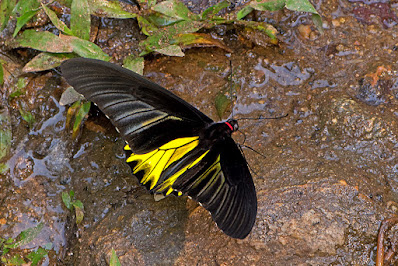 |
| Lamnamkok National Park, Chiang Rai, Thailand ♂ 450m a.s.l. |
Habitat: Troides aeacus is found in open spaces within tropical and semi-tropical forests, forest edges, and disturbed forest. It occasionally visits urban parks and gardens. It has been recorded at elevations up to 2700m a.s.l. in the Himalayas.
Flight time: all year depending on location Wingspan: 110-180mm
Life History: egg 3-10 days instar 1 2-9 days instar 2 3-8 days instar 3 2-6 days instar 4 3-9 days instar 5 2-7 days pupa 18-31 days Total egg to adult 33+ days
All times are approximate. NOTE: the winter generations between September and March take the longest times. When the pupa overwinters it can last from 122-172 days.
Larval Hosts: Aristolochia acuminata, Aristolochia cathcartii, Aristolochia contorta, Aristolochia cucurbitifolia, Aristolochia debilis, Aristolochia foveolata, Aristolochia griffithii, Aristolochia heterophylla, Aristolochia indica,Aristolochia kaempferi, Aristolochia littoralis, Aristolochia manshuriensis, Aristolochia pothieri, Aristolochia saccata, Aristolochia shimadae, Aristolochia zollingeriana, Thottea dependens, Thottea parviflora, Thottea piperiformis, Thottea tomentosa, Thottea tricornis (Aristolochiaceae).
Actual host plant used depends upon location and availabilty of plant species.
Adult Food Sources: Nectar - Albizia julibrissin, Cheniella glauca (Fabaceae), Clerodendrum bungei, Clerodendrum japonicum (Lamiaceae), Ailanthus altissima (Simaroubaceae), Duranta erecta, Lantana camara (Verbenaceae), Ixora chinensis (Rubiaceae), Jatropha integerrima (Euphorbiaceae). There may be other nectar sources that have not been recorded. Other - mud puddling.
 |
| Doi Suthep-Pui National Park, Chiang Mai, Thailand ♂ |
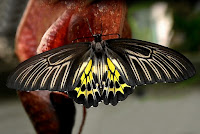 |
| Doi Suthep-Pui National Park, Chiang Mai, Thailand ♀ |
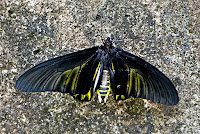 |
| Doi Suthep-Pui National Park, Chiang Mai, Thailand ♂ |
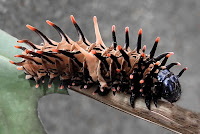 |
| late instar larva |
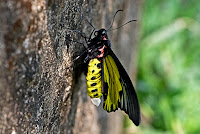 |
| Doi Suthep-Pui National Park, Chiang Mai, Thailand ♂ |
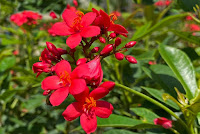 |
| Jatropha integerrima, a nectar source |
 |
| Clerodendrum bungei, another nectar source |
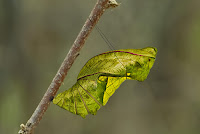 |
| pupa |
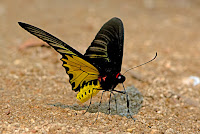 |
| Doi Suthep-Pui National Park, Chiang Mai, Thailand ♂ |
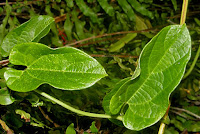 |
| Aristolochia acuminata, a larval host |
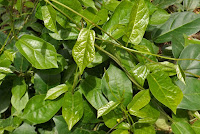 |
| Aristolochia indica, another larval host |
Links to other pages in this series for species in the same subfamily
